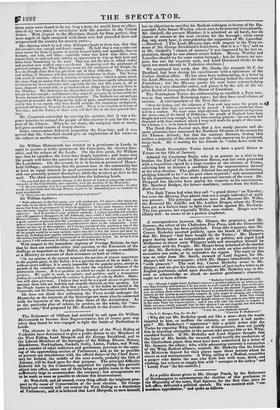Sir William Molesworth has written to a gentleman in Leeds,
in reply to queries as to his opinions on the Corn-laws, the elective fran- chise, and the reform of the Lords. On the first point, Sir William says that he considers the Corn-laws deeply injurious; and hopes that the people will force the question of their abolition on the attention of the Legislature. On the second, he is in favour at present of House- hold Suffrage ; conceiving that the poorest man in the community has at least an equal interest in good government as the richest ; for the rich can generally protect themselves, while the weakest go first to the wall. The third question branched into the following heads.
" Do you bold that an organic change of the House of Lords is compatible with the integrity of the Constitution, and especially In ith the security of the Monarchy.
" 2. Ito you consider it to be a question of immediate and urgent necessity ; in other werds, do you think that Peerage Reform ought to be demanded,;.now as essential to good government.
" 3. Have you any definite and matured plan to propose ?"
Sir William replies-
" With reference to the first query, you will pardon me, if I observe, that when any one talks to me about the • Constitution' of England, I invariably understand him to mean that form of government of which he approves; in the same manner, when Ile uses the term organic' change, I understand that species of change of which he nis. approves. As I do not know your political opinions, I cannot possibly tell allether you will approve or disapprove of the following ones, hich I hold a ill, regard to the House of Lords. The conduct of the Peers during the two last sessions has convinced a great number of persons that the aristocracy a ill endeavour, so far as it has thin power, to promote its own interests in preference to thrice of the community. I cer- tainly am not one of that number ; furl aluays considered this position as one of the clearest results of the laws of human nature. I did not, however, expect that the eyes of the people would be so soon opened; and I own that I feel the truest and most in- tense joy in finding bow rapidly and how generally the cons iction is spreading amongst the nation, that the hereditary government of the aristocracy is bad. As far as it is in my power, I will endeavour to diffuse and augment that feeling."
With respect to the immediate urgency of Peerage Reform, he says that be does not consider either that question or the Extension of the Suffrage so important as the Ballot, and would not oppose a candidate or a Ministry on account of their resistance to both or either- " In my opinion, at the present moment, the question of utmost importance to the popular party, is the Ballot: it is a question almost of life or death ; for without secret suffrage, it is nearly impossible for the popular party, except in periods of the extremest excitement, to resist the combined influence of the aristocratic classes. It is a question on which we ought to assent to no com- promise. We ought to meet, to agitate, and petition, until a tremendous feeling be excited throughout the country in favour of rote by Ballot. Minis- ters will then give way. I believe they wish for a a good excuse to give those amongst them who are foolishly and stupidly obstinate on this question. Let the People hasten to afford them that excuse : if the Ballot be carried in the Commons, and the Peers resist, they will thereby seal their well-merited doom."
He does not think that reforming the Peers would endanger the Monarchy, as the interests of the Sovereign are more closely connected with the interests of the People than those of the Aristocracy. As to the particular plan of reform, he prefers, on the whole, the "sus- pensive veto," first proposed by Mr. Roebuck in the London Review.


























 Previous page
Previous page